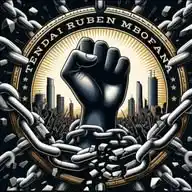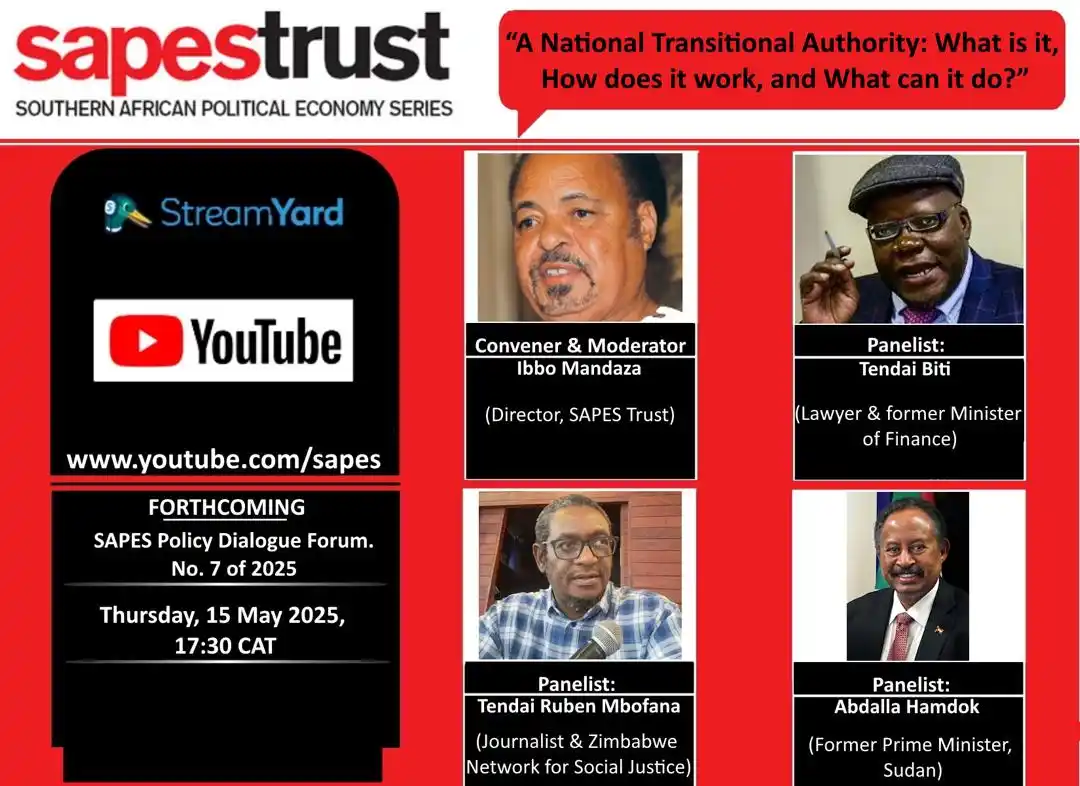
Tendai Ruben Mbofana - The Un-Oppressed Mind
6.2K subscribers
About Tendai Ruben Mbofana - The Un-Oppressed Mind
Thank you for subscribing to my WhatsApp Channel, where you are guaranteed easier access to my articles and work in social justice advocacy.
Similar Channels
Swipe to see more
Posts

https://mbofanatendairuben.news.blog/2025/05/16/zimbabwe-needs-a-reset-through-an-nta-to-prepare-for-democratic-transition/ *_PLEASE SHARE_* *Zimbabwe needs a reset through an NTA to prepare for democratic transition* _BY Tendai Ruben Mbofana_ *ZIMBABWE is teetering on the brink.* We are witnessing a nation sliding further into economic despair, political illegitimacy, and social disintegration. The alarm bells are ringing loud, yet we continue as if nothing is amiss. But if this is not a crisis, then what is? We are a country that has been through one disputed election after another. These are elections that have not only failed to unite the nation but have left us even more polarized and broken. Violence, intimidation, and the subversion of state institutions like the Zimbabwe Electoral Commission (ZEC), the police, the judiciary, and the public broadcaster have all become a norm. *_To directly receive articles from Tendai Ruben Mbofana, please join his WhatsApp Channel on: https://whatsapp.com/channel/0029VaqprWCIyPtRnKpkHe08_* They have systematically been weaponized in favor of the ruling elite and against the will of the people. The 2023 elections were condemned by nearly all credible regional and international observer missions—SADC, AU-COMESA, the European Union, and the Commonwealth—all of whom found the polls to have fallen far short of accepted standards for democratic elections. Yet, despite this damning verdict, no meaningful corrective action has been taken by Zimbabweans themselves or the international community. We have effectively normalized illegitimacy. The consequences have been devastating. After failing to secure a two-thirds majority in Parliament required for constitutional amendments, the ruling ZANU-PF found an unlikely ally in the self-imposed “interim secretary general” of the CCC opposition party, Sengezo Tshabangu. His bizarre and relentless recall of elected opposition legislators—enabled and rubber-stamped by a partisan Speaker of Parliament and upheld by the courts—handed ZANU-PF the two-thirds majority it desperately needed on a silver platter. This maneuver effectively neutralized Parliament as a check on executive power. It is now filled with legislators who are either too aligned with the ruling elite or too terrified of losing their seats to dare hold the government accountable. The result is a rubber-stamp Parliament, presiding over a looted economy and a collapsing state. Zimbabwe loses over US$3 billion annually through corruption and illicit financial flows. Our public hospitals are in shambles, devoid of basic medications and functional equipment. Cancer patients and those needing dialysis are sent home to die. Ambulances are scarce, and health professionals are overworked and underpaid. Schools are little more than glorified huts—many without desks, chairs, or textbooks, where children sit on rocks under trees. Our civil servants survive on an insulting average of US$200 a month, while the cost of living continues to skyrocket due to runaway inflation. Over 80% of Zimbabweans live in poverty, and more than 90% are unemployed. To make matters worse, scandals involving government-linked individuals, such as convicted criminal Wicknell Chivayo receiving over R800 million from South Africa’s Ren-Form CC—allegedly for electoral materials—have been swept under the rug. Parliament, which should have investigated and held these individuals to account, is conspicuously silent. The system is broken. The people are suffering. The looting continues. The growing divisions within ZANU-PF itself—fueled by the unpopular push to extend President Emmerson Mnangagwa’s term beyond the constitutional two-term limit—have only escalated the crisis. Prominent voices such as expelled Central Committee member Blessed Geza have openly called for the President’s resignation. There is a real danger of another military coup if the current trajectory continues. The atmosphere is tense, with a growing sense that Zimbabwe is a ticking time bomb. The opposition, weakened and infiltrated, stands little chance in this manipulated political environment. Civil society is under siege. Fear reigns supreme. Even those in the ruling party who genuinely want reform are silenced by the threat of political persecution. This is not democracy. This is not stability. This is the road to state failure. This is why Zimbabwe needs a National Transitional Authority (NTA)—a non-partisan, inclusive, and time-bound mechanism to reset the country. An NTA is not a Government of National Unity (GNU). It is not a power-sharing deal between political parties. It is not a Trojan horse for any party to sneak into power. Rather, it is a framework for stabilizing the nation, rebuilding critical institutions, and creating conditions for genuinely free, fair, and credible elections. It is a temporary body—composed of technocrats, civil society leaders, representatives from political formations (including those from the ruling party), and respected individuals from the faith, business, and academic communities. It operates under strict timelines and mandates and does not involve partisan jockeying for power. For those who remain skeptical—particularly within the opposition—fearing that an NTA might somehow rob them of their rightful path to power, let us look to history for assurance. In the early 1990s, South Africa was at a similarly fragile crossroads, transitioning from the brutal apartheid regime to democracy. A transitional authority—the Transitional Executive Council (TEC)—was established not as a means to deny the African National Congress (ANC) power, but to ensure a credible and peaceful transition. Nelson Mandela and the ANC did not view this structure as an obstacle to their aspirations, but as a necessary and stabilizing bridge to usher in democracy. In fact, it helped ensure that the first democratic elections in 1994 were held under conditions that leveled the playing field, avoided civil war, and guaranteed legitimacy for the incoming government. Zimbabwe, too, can follow this example. The role of the NTA would be to oversee critical reforms. These would include reforming state institutions like ZEC, the judiciary, and law enforcement to ensure neutrality and professionalism. It would guarantee media freedom and access to all political actors. It would tackle corruption decisively, ensuring transparent management of public finances and natural resources. It would prioritize the revival of public services—especially health, education, and infrastructure. And, most importantly, it would prepare and oversee fresh elections, conducted under a level playing field, with full international supervision, so that Zimbabweans can finally choose their leaders in a credible and transparent manner. Yes, those in power will likely resist the idea of a National Transitional Authority, as it threatens their grip on unchecked control. But history shows us that when a people unite—regardless of political affiliation, tribe, or background—and raise their voices in unison, even the most entrenched regimes are forced to listen. If we, as Zimbabweans, stand together and consistently demand a reset through an NTA, we will not only shift the political temperature internally, but also signal to the international community—especially regional and continental bodies—that we are serious about charting a new course. That solidarity will increase global pressure on our leaders to yield to the will of the people. Only under such an environment can the opposition ever hope to win an election based on popular support. Only then can even genuine reformers within ZANU-PF speak up without fear of retribution. Only then can citizens freely criticize their leaders without being branded as enemies of the state. Only then can Parliament function as a real check on executive excesses. Only then can corruption be curtailed, the economy revived, and public services restored. We are not calling for a violent overthrow. We are not calling for the collapse of the state. We are calling for a responsible pause—for Zimbabweans across the board to come together and fix what is broken. This is about patriotism. This is about survival. This is about giving our children a future. If we continue on our current path, we risk becoming another Somalia. Civil unrest is not just possible; it is probable, especially as economic hardship intensifies, political divisions deepen, and public anger simmers under the surface. We are a country sitting on a powder keg. It is time for Zimbabweans of all political persuasions—within the ruling party, the opposition, civil society, the business community, and the general public—to rally behind a bold, peaceful, and practical solution. A National Transitional Authority offers us a way out. A way forward. A way to restore legitimacy, rebuild trust, and save our country from the abyss. Let us not wait until it is too late. *_● Tendai Ruben Mbofana is a social justice advocate and writer. Please feel free to WhatsApp or Call: +263715667700 | +263782283975, or email: [email protected], or visit website: https://mbofanatendairuben.news.blog/_*

https://mbofanatendairuben.news.blog/2025/05/15/who-really-benefits-from-the-zimbabwe-belarus-deal-to-renovate-parirenyatwa-hospital/ *_PLEASE SHARE_* *Who really benefits from the Zimbabwe-Belarus deal to renovate Parirenyatwa Hospital?* _BY Tendai Ruben Mbofana_ *WHAT appears noble on the surface often conceals a far more troubling reality.* During President Emmerson Mnangagwa’s recent state visit to Belarus, a bilateral agreement was signed between the two countries for the renovation of Parirenyatwa Hospital in Harare. On the surface, this appears like a noble gesture aimed at reviving Zimbabwe’s ailing public healthcare sector. However, beneath the headlines and official statements lies a complex and troubling story that demands deeper scrutiny and more honest reflection. This agreement is far from the cause for celebration it may appear to be. *_To directly receive articles from Tendai Ruben Mbofana, please join his WhatsApp Channel on: https://whatsapp.com/channel/0029VaqprWCIyPtRnKpkHe08_* Parirenyatwa Hospital—once one of the finest health institutions in Africa during the colonial period, when it was known as Andrew Fleming Hospital—has tragically become a shadow of its former self. At the time, it was reserved exclusively for the white minority and boasted cutting-edge facilities and services. However, four decades after independence, the hospital, like much of Zimbabwe’s public healthcare infrastructure, is in a horrifying state of neglect. Ceilings are collapsing, rainwater seeps through gaping holes in the roof, and wards lack even the most basic medications. Critical machines, such as those for dialysis and cancer treatment, are frequently broken or completely unavailable. Only a few operating theatres remain functional, forcing many patients to endure dangerous delays or pay exorbitant fees at private institutions they can barely afford. In this context, the renovation of Parirenyatwa sounds like a much-needed lifeline. But we must ask: why do we need Belarus—a struggling Eastern European country, a former Soviet republic with far fewer natural resources than Zimbabwe—to renovate our hospital? Zimbabwe is immensely rich in mineral resources. From gold, diamonds, and platinum to lithium, chrome, and coal, our land is a veritable treasure trove. If properly managed, these resources should more than suffice to modernize not only Parirenyatwa but every public hospital in the country. If things were normal in Zimbabwe, we should be the ones assisting Belarus, not the other way around. And yet, here we are—begging Belarus for assistance. This paradox underscores a far more damning reality: our national wealth is not benefiting the people of Zimbabwe. Instead, it is being plundered by an elite few with proximity to power, who have enriched themselves through illicit financial transactions, opaque deals, and rampant smuggling. While the masses queue for medication or are sent home to die due to the unavailability of essential treatment, a privileged minority flaunts obscene wealth gained through the looting of our national resources. The question must then be asked: if the Zimbabwean government can violently suppress voices of dissent, muzzle the media, and unleash the security apparatus on peaceful protestors with such efficiency, why does it not apply the same energy and ruthlessness in cracking down on corruption and illicit financial flows? It is estimated that Zimbabwe loses over US$3 billion annually to corruption. Just imagine what that money could do for our health sector. Imagine what Parirenyatwa Hospital—and all other provincial and district hospitals—would look like if even a fraction of those funds were redirected to healthcare. Instead, the government has chosen to parade its Belarusian partnership as a shining example of progress, while ignoring the deeper rot. Even worse, there is reason to suspect that this latest deal may not be as altruistic as it seems. Why is only Parirenyatwa Hospital being renovated? What about Mpilo Central Hospital in Bulawayo, Sally Mugabe Central Hospital, or rural clinics in places like Muzarabani and Binga? Are these facilities not also collapsing under the same weight of underfunding and neglect? This selective focus suggests not a comprehensive plan to uplift public health, but rather a symbolic gesture designed to score political points or worse—mask a deeper, more sinister motive. This concern is not unfounded. Zimbabwe’s past dealings with Belarus have been anything but transparent. Many of these so-called “strategic partnerships” have benefited a select few individuals with close ties to the corridors of power. Take, for instance, the controversial fire tender deal in which local authorities across Zimbabwe were compelled to accept fire trucks sourced from Belarus—at prices nearly three times above international market value. These tenders, facilitated by Alexander Zingman, Zimbabwe’s honorary consul in Minsk and a close ally of President Emmerson Mnangagwa, were supplied through his company Aftrade DMCC under questionable circumstances. Each fire truck reportedly cost Zimbabwe US$464,296, compared to just US$194,000 for similar models purchased by Mongolia from the same Belarusian manufacturer. The deal was imposed on councils without a public tender process, with the exorbitant costs deducted directly from their constitutionally allocated devolution funds. Local leaders decried this top-down imposition, arguing that what communities truly needed were ambulances, clinics, and other essential services—not overpriced fire engines. Yet, as with many of Zimbabwe’s opaque deals with Belarus, it was politically connected elites—not the struggling Zimbabwean people—who emerged as the real beneficiaries. Then there are the controversial mining and agricultural equipment deals also involving Zingman. Investigative reports, particularly by the Organized Crime and Corruption Reporting Project (OCCRP), have revealed that Zingman, alongside former Belarusian presidential envoy Sergei Sheiman, was secretly involved in a gold mining venture in Zimbabwe under the guise of a state-to-state partnership. Their ownership was concealed through offshore companies registered in jurisdictions like the Seychelles and the United Kingdom—raising serious concerns about conflicts of interest, transparency, and accountability. Zingman’s company, Aftrade DMCC, has also been linked to multiple deals involving the supply of agricultural machinery to Zimbabwe. These transactions were often characterized by inflated prices, lack of competitive bidding, and questionable value for money. Despite their presentation as strategic development initiatives, these arrangements appear to have benefited a small circle of politically connected individuals rather than the ordinary Zimbabwean. Such murky deals have only deepened Zimbabwe’s debt burden and public frustration, while doing little to genuinely improve infrastructure or service delivery. These past experiences should raise red flags about the Parirenyatwa agreement. Who exactly is going to benefit? Will this be another inflated contract awarded without public tender? Will it involve intermediaries with ties to the ruling elite, who will pocket millions while the hospital gets a cheap paint job and is declared “revamped” for media optics? These are not cynical questions—they are essential ones grounded in Zimbabwe’s lived reality of corruption and betrayal. Moreover, it is impossible to ignore the timing of this hospital deal. Just recently, Zimbabweans learned of the scandal involving convicted criminal and notorious tenderpreneur Wicknell Chivayo. South Africa’s Ren-Form CC was paid R1.1 billion by Zimbabwe’s Treasury for election materials in 2023. Shockingly, R800 million (about US$44 million) of that money was immediately transferred into Chivayo’s business accounts—without any explanation from government officials. That money, which could have built or upgraded multiple hospitals, instead disappeared into private hands. And the state remained ominously silent. This is the real tragedy of Zimbabwe. The problem is not a lack of resources. The problem is not Western sanctions. The problem is not insufficient international aid. The problem is corruption—plain and simple. A political elite that views the state not as a servant of the people but as a personal treasure chest. A government that is quick to crush criticism but too timid to confront the cartels bleeding the country dry. It is in this context that the Belarus-Parirenyatwa deal must be evaluated. Zimbabweans are not ungrateful or suspicious by nature. But after decades of betrayal, broken promises, and elite enrichment disguised as development, we have every reason to question who will truly benefit from this agreement. Until we see real transparency, real accountability, and real commitment to national development—beyond flashy announcements and staged handshakes—we will remain skeptical. Parirenyatwa Hospital deserves to be renovated. So does every hospital in Zimbabwe. But not through murky deals and foreign dependency. Zimbabwe must rise using its own wealth, through honest leadership and people-centred governance. That is the only path to dignity, sovereignty, and true national healing. *_● Tendai Ruben Mbofana is a social justice advocate and writer. Please feel free to WhatsApp or Call: +263715667700 | +263782283975, or email: [email protected], or visit website: https://mbofanatendairuben.news.blog/_*

https://mbofanatendairuben.news.blog/2025/05/18/chivayo-boasts-about-being-a-chigananda-because-he-knows-were-cowards-who-will-do-nothing/ *_PLEASE SHARE_* *Chivayo boasts about being a Chigananda because he knows we’re cowards who will do nothing* _BY Tendai Ruben Mbofana_ *IT can be so embarrassing to be a Zimbabwean.* Wicknell Chivayo’s brazen public declaration, on X (formerly Twitter), of being a “very corrupt businessman and tenderpreneur” is not merely a scandalous self-indictment—it’s a chilling reflection of how low we have sunk as a society. That a man previously convicted of fraud, and implicated in numerous multi-million-dollar corruption scandals, can publicly boast about looting public resources without fear or shame shows just how broken our country’s moral compass has become. It also reveals something far more disturbing: he knows we, the people of Zimbabwe, will do absolutely nothing. *_To directly receive articles from Tendai Ruben Mbofana, please join his WhatsApp Channel on: https://whatsapp.com/channel/0029VaqprWCIyPtRnKpkHe08_* This is no idle insult. Chivayo’s record speaks for itself. He is at the center of several serious corruption scandals, some with regional and international implications. South African law enforcement authorities recently exposed that Chivayo received a staggering R800 million from Johannesburg-based Ren-Form CC, a company awarded a suspicious R1.1 billion tender by Zimbabwe’s Treasury, ostensibly for the procurement of election materials. Yet no one in Zimbabwe’s government has ever demanded accountability for this massive payout. Investigations revealed that much of this money funded Chivayo’s opulent lifestyle—including a fleet of luxury cars and five-star jet-set living. He even flaunted his intentions to purchase a Bombardier Global 5500 private jet, worth over US$51 million, as if to taunt the millions of Zimbabweans barely surviving in a crumbling economy. Chivayo is also deeply entangled in the long-standing Zimbabwe Electricity Supply Authority (ZESA) corruption scandal, in which he was controversially awarded a US$5 million advance for the construction of a 100MW solar power plant in Gwanda. To this day, there is no solar plant to speak of—just an empty field. Years have passed and not a single watt has been generated, yet there has been no official investigation, no public outcry, and no consequences. And this is not all. His name continues to feature in several other questionable public tenders, always involving astronomical figures, and all awarded without transparency. Yet, as hospitals across Zimbabwe run out of basic medications, dialysis and cancer treatment machines remain broken, and ambulances lie idle or are non-existent, no one in authority dares to speak his name in condemnation. Meanwhile, schools—especially in rural areas—look like relics from the 1800s. Children are still learning under trees or inside makeshift pole-and-dagga classrooms, with barely any chairs, desks, or books. In urban areas, power cuts have returned with a vengeance because our antiquated power plants are not being upgraded or replaced. Yet the country has been losing billions of dollars annually to corruption, much of it facilitated through the very same kinds of questionable deals that have enriched Chivayo. Still, this man is not only walking free—he is celebrated. He enjoys unfettered access to the President of Zimbabwe, frequently appears at State House, and is even included in official state visits and functions. In a shocking betrayal of the public trust, a convicted criminal, who has defrauded the nation and looted its future, has effectively become part of the political establishment. Instead of being investigated or tried, he is rewarded with proximity to power. This is precisely why Wicknell Chivayo can boast, without shame or hesitation, about being a “chigananda.” He knows he is untouchable. He knows that the very people he is fleecing are too afraid, too demoralized, or too distracted to mount any real resistance. He knows that no Zimbabwean official will dare challenge him—not the Zimbabwe Anti-Corruption Commission (ZACC), not the judiciary, not the police, and certainly not the ruling party. In fact, those in power appear to enable him. But here is what frightens me more than Chivayo’s audacity: our silence. What about us, the citizens? Why are we behaving as though this is normal? Why are we not in the streets, demanding answers, justice, and change? After all, it is our lives that are being destroyed by this corruption. While Chivayo boasts about taking off in his private jet to Mozambique for a seafood lunch, our mothers are dying in maternity wards due to the absence of gloves, oxygen tanks, or skilled staff. While he flaunts his Rolls Royce V12 and electric cars, our children trudge to dilapidated schools without textbooks or proper classrooms, their futures stolen before they’ve even begun. And, truly, on what roads does he “drive off at high speed,” when those very roads are now treacherous death traps, with potholes deep enough to swallow entire vehicles—roads that should have been fixed using the money stolen by the “Zvigananda”? Why do we tolerate this? Is it cowardice? Apathy? Or have we been so traumatized and brutalized by decades of repression that we’ve accepted our suffering as inevitable? In other countries, citizens have shown that pressure from below can force change. In Romania, 2017, when the government attempted to decriminalize certain forms of corruption, over 600,000 people took to the streets in protest. The decree was reversed. In Brazil, a massive anti-corruption investigation known as “Operation Car Wash,” launched in part due to intense public pressure, exposed a vast network of bribery involving the state oil company Petrobras and numerous political and business elites. The scandal led to the imprisonment of top politicians and executives, including president Luiz Inácio Lula da Silva, who was convicted and jailed—though his convictions were later overturned by the Supreme Court on procedural grounds. In South Korea, millions of citizens staged peaceful protests demanding the impeachment of President Park Geun-hye over corruption allegations. The National Assembly voted to impeach her in December 2016, and the Constitutional Court upheld the decision in March 2017, leading to her removal from office. Park was subsequently arrested, tried, and sentenced to 24 years in prison for abuse of power and coercion. These examples show us what is possible when citizens find their voice and demand justice. But here in Zimbabwe, our silence is damning. We tweet. We write. We whisper. We gossip. But we do not act. And this is exactly what Chivayo is counting on. This is why he laughs in our faces, calling himself corrupt while flaunting his ill-gotten wealth. Because we’ve let him believe that there are no consequences. That we are too scared. That we are too divided, too hungry, or too distracted to resist. Meanwhile, Zimbabwe continues its descent into lawlessness. The latest Transparency International Corruption Perception Index ranked Zimbabwe as the most corrupt country in Southern Africa, with a 2024 score of just 21 out of 100. An estimated US$3 billion is lost annually to illicit financial flows, mineral smuggling, and corrupt deals—money that could transform this country into a beacon of progress and dignity. ZACC, the body supposedly responsible for tackling corruption, has become a toothless watchdog. While small-time offenders are paraded for public show, the real looters remain insulated by political connections. This is the rot that Chivayo thrives in—a system where thieves are kings and citizens are spectators in their own destruction. Let us be clear: the Chivayos of Zimbabwe will not suddenly repent and return what they’ve stolen. They will not stop unless they are made to. And that duty falls on us—the suffering, overburdened citizens of this great nation. We must move beyond private outrage and social media complaints. We must organize. We must protest. We must demand accountability in every forum available to us. Because if we don’t, then we have no one to blame but ourselves when the next Chivayo tells us, with a smile and a shrug, that he is a proud “chigananda”—and we all just look away. *_● Tendai Ruben Mbofana is a social justice advocate and writer. Please feel free to WhatsApp or Call: +263715667700 | +263782283975, or email: [email protected], or visit website: https://mbofanatendairuben.news.blog/_*

https://mbofanatendairuben.news.blog/2025/05/16/its-time-zimbabweans-had-the-power-to-directly-recall-mps-and-the-president/ *_PLEASE SHARE_* *It’s time Zimbabweans had the power to recall MPs and the President* _BY Tendai Ruben Mbofana_ *THE real power—or lack thereof—of a country’s people is revealed in its supreme law.* One of the most troubling loopholes within Zimbabwe’s Constitution is the disempowerment of the very people who elect their leaders. This contradiction is deeply embedded in our system: citizens can directly elect Members of Parliament (MPs), ward councillors, and even the president, yet have no legal avenue to directly recall them when they fail in their duties. The power of recall rests not with the electorate, but with political parties or internal institutional processes, which are often manipulated for factional or personal gain. It is an affront to the very foundations of democracy and accountability, and it is a loophole that must be urgently addressed. *_To directly receive articles from Tendai Ruben Mbofana, please join his WhatsApp Channel on: https://whatsapp.com/channel/0029VaqprWCIyPtRnKpkHe08_* In any credible institution or organisation, the principle is simple and universal: he who appoints must also have the power to dismiss. This is rightly recognised within our own Constitution. The President, for instance, has the authority under Section 104(1) of the Constitution to appoint ministers and, under Section 108(1)(a), to dismiss them. This is a clear acknowledgement of the principle that authority to select should also come with the power to remove. So why, then, are Zimbabwean citizens – who are the ones who elect the president, MPs, and councillors – denied this same authority? Why must the electorate wait for a full five-year electoral cycle, regardless of how non-performing, corrupt, unresponsive or even outright abusive their elected officials become? Zimbabwean MPs and ward councillors have, by and large, failed to live up to the constitutional responsibility of representing the people’s interests and safeguarding the public good. Parliament, which should serve as the country’s foremost watchdog over the Executive, has instead become largely complicit through its deafening silence and inaction. Despite repeated reports exposing massive financial mismanagement, irregular tender awards, and unexplained disbursements of public funds—some amounting to hundreds of millions of U.S. dollars—legislators have largely failed to initiate meaningful inquiries or hold public officials accountable. They have not pressed for explanations from Treasury or demanded transparency in how resources are allocated and spent. It is particularly damning that most parliamentary portfolio committees, which are mandated to oversee government ministries and state-owned enterprises, often function as ceremonial structures with no tangible impact on curbing corruption or improving service delivery. Even as hospitals operate without basic drugs and schools lack textbooks, furniture, or adequate sanitation, our elected representatives have remained conspicuously silent. At the local level, the performance of councillors has been equally dismal. Across Zimbabwe’s towns and cities, residents endure persistent water shortages, uncollected refuse, potholed roads, collapsing sewer systems, and crumbling health and education infrastructure—all under the watch of elected local authorities. Yet, there has been minimal effort from ward councillors to confront these challenges head-on or to demand accountability from urban management bodies. This glaring failure to advocate for the people they represent strengthens the case for constitutional reform that gives citizens the power to recall those who neglect their duties. The current system of impeachment and party-based recalls is not only insufficient, but often anti-democratic in practice. The Constitution does provide for mechanisms to impeach the president under Section 97, which outlines grounds such as serious misconduct, failure to uphold the Constitution, and inability to perform presidential functions. However, this process is entirely in the hands of Parliament – specifically, the political party with the majority. As a result, it is not a safeguard for the electorate but rather a tool of internal party power dynamics. The forced resignation of President Robert Mugabe in 2017, following the threat of impeachment, serves as a textbook example. His removal had little to do with the will of the people – who had long expressed frustration with his rule – and everything to do with internal ZANU-PF succession battles. Similarly, the recall of MPs is governed by Section 129(1)(k) of the Constitution, which allows a political party to notify the Speaker of Parliament that an MP has ceased to belong to that party – triggering an automatic dismissal from Parliament. This provision has proven ripe for abuse. It is not the voters who determine the fate of a non-performing or unethical MP, but the leadership of their political party. What has emerged is a system in which MPs are more loyal to their party bosses than to the people who voted for them. It is no surprise, then, that no MP has ever been recalled for failing to fulfil their campaign promises or neglecting their duties in Parliament. Recent events only underscore this democratic deficiency. From late 2023, Zimbabwe witnessed a wave of opposition MP recalls by Sengezo Tshabangu, the self-declared “interim secretary general” of the Citizens Coalition for Change (CCC). Backed by the Speaker of Parliament and the courts, his recalls were less about principle and more about consolidating power – despite the clear absence of a democratic mandate from the CCC’s structures or the electorate. Meanwhile, ZANU-PF also joined in recalling its own MPs and councillors who openly opposed President Emmerson Mnangagwa’s suspected attempt to extend his tenure beyond the constitutionally permitted two five-year terms. A notable example is Gutu East MP Benjamin Ganyiwa, who was expelled and subsequently recalled from Parliament for allegedly promoting factionalism and organizing unauthorized meetings critical of the president. These dismissals had nothing to do with the public interest or the representatives’ performance; rather, they were clear political purges aimed at silencing dissent within the party ranks. Equally disturbing is the weaponisation of the impeachment provision. Any attempt to frame such actions as serving the will of the people is disingenuous. Take, for example, recent calls by expelled ZANU-PF Central Committee member and war veteran Blessed Geza for Parliament to impeach Mnangagwa, citing failure to lead. While such claims may resonate with the public’s frustrations, they are more accurately read as part of the internal succession battles within the ruling party. The people’s voices, as always, remain unheard in the formal processes. This crisis of representation and accountability calls for a bold and transformative amendment to the Constitution. Zimbabweans must be granted the constitutional right to recall elected officials – including MPs, councillors, and even the president – through a citizen-initiated process. This could involve a petition system in which a prescribed percentage of registered voters in a constituency, ward, or nationally could sign a recall petition. Once the threshold is reached, a by-election or recall referendum should be triggered, allowing citizens to decide the fate of their elected representative. This is not a radical idea. Rather, it is the logical extension of the right to vote. If we have the power to hire, we must have the power to fire. This system exists elsewhere. In the United States, many states empower voters with the ability to recall elected officials through a formal petition process followed by a vote. This mechanism provides a direct means for citizens to hold their representatives accountable between regular elections. One of the most famous examples is California’s 2003 gubernatorial recall, where Governor Gray Davis was removed from office and replaced by Arnold Schwarzenegger, illustrating the power of direct democracy in action. Beyond the US, other countries have embraced similar recall systems. In Taiwan, for example, citizens can initiate recall petitions against legislators, which, if successful, lead to a recall vote. This process has been used to enforce accountability and maintain public trust in elected officials. Venezuela also allows recall referendums for elected officials, providing a constitutional tool for voters to remove representatives who fail to meet their responsibilities. These international examples underscore the importance of giving citizens real power to remove underperforming or unpopular leaders, strengthening democratic governance. These mechanisms are not always perfect, but they reinforce a crucial democratic principle: power resides with the people, not parties. In Zimbabwe, however, constitutional amendments have gone in the opposite direction. Rather than strengthening the hand of the electorate, changes have consolidated power in the executive. The first attempt to amend the 2013 Constitution came in 2017 through Amendment No. 1, which sought to give the President unilateral power to appoint the Chief Justice, Deputy Chief Justice, and Judge President of the High Court—replacing the original requirement for public interviews and Judicial Service Commission recommendations. However, this amendment was later struck down by the Constitutional Court in 2020 due to procedural irregularities in its passage through Parliament. A more far-reaching and successfully enacted change came through Amendment No. 2, passed in 2021. This amendment significantly expanded presidential powers by removing the presidential running mate clause—thereby allowing the President to handpick vice-presidents without public endorsement—and permitting judges to remain in office beyond the retirement age of 70, subject to the President’s approval. These changes marked a clear shift away from democratic safeguards and toward greater executive control. These changes undermined the gains of the 2013 Constitution, stripping away mechanisms designed to safeguard transparency and accountability. It is therefore imperative that constitutional reform efforts move beyond entrenching executive control and instead focus on empowering citizens. Democracy is more than voting every five years. It is the ability to hold leaders accountable in real-time. Without the power of recall, elections become a hollow ritual. The people of Zimbabwe deserve better. They deserve to have the authority not only to elect their leaders but to remove them when those leaders betray the public trust. Until that right is enshrined in our Constitution, Zimbabwean democracy will remain incomplete – a system where the people can choose their leaders, but cannot stop them from choosing themselves over the nation. *_● Tendai Ruben Mbofana is a social justice advocate and writer. Please feel free to WhatsApp or Call: +263715667700 | +263782283975, or email: [email protected], or visit website: https://mbofanatendairuben.news.blog/_*

https://mbofanatendairuben.news.blog/2025/05/17/zimbabwes-bleeding-healthcare-system-doesnt-deserve-a-minister-who-is-always-missing-in-action/ *_PLEASE SHARE_* *Zimbabwe’s bleeding healthcare system doesn’t deserve a Minister who is always missing in action* _BY Tendai Ruben Mbofana_ *YOU'D expect an emergency to demand urgency and serious attention — but not in Zimbabwe’s healthcare system.* Zimbabwe’s healthcare system is gasping for air. It is crippled by dilapidated infrastructure, erratic or entirely non-existent water supply, and frequent electricity outages. Cancer and dialysis machines are broken down, essential drugs are in constant short supply, and nurses and doctors are fleeing en masse to countries like the United Kingdom due to poor remuneration. *_● If you believe in Tendai Ruben Mbofana’s fight for justice in Zimbabwe, please consider supporting his work financially. Every contribution helps him keep going, independently and fearlessly._* In such a crisis, one would expect the Minister of Health and Child Care to be among the most active and visible figures in government. After all, his is not a ceremonial portfolio. It is a life-and-death assignment. Yet since his appointment by President Emmerson Mnangagwa in September 2023, Minister Douglas Mombeshora has, in a year and a half, only managed to directly engage with frontline medical staff and personally assess public hospitals twice. That alone is a scandal. The reality is that Zimbabwe’s public healthcare sector is in a state of collapse. The majority of public hospitals are a tragic shadow of what they ought to be. Operating theatres are grossly under-equipped. There are hardly any working cancer machines. Dialysis units can barely cater to the overwhelming demand. Bedding is worn out. Wards are overcrowded. Ambulances are scarce. There are barely any essential drugs in most pharmacies. And frontline health professionals — our nurses, midwives, doctors, and support staff — are poorly paid, overworked, and routinely disrespected. They are leaving the country in droves, often retraining as care workers abroad, because they see no future in the broken system that Zimbabwe insists on calling healthcare. Despite this grim reality, the man at the helm of this troubled sector has not shown the urgency, commitment, or hands-on leadership one would expect. Minister Mombeshora’s two known visits — one to Ingutsheni Central Hospital in December 2024 and the other to Parirenyatwa Group of Hospitals just yesterday, May 16, 2025 — are his only clear engagements where he has sat down with nurses and doctors to hear their concerns and tour the facilities. Two visits in 18 months. Two. That’s not a man at work. That’s a man watching from a safe distance while the house burns. Even when nurses protested in March 2025 at Sally Mugabe Central Hospital over deplorable working conditions and lack of resources, the Ministry issued a public statement — but the minister himself never showed up. He has still not shown up. Not even once to face the very professionals whose hands keep the fragile healthcare system from total collapse. What makes matters worse is that even after fellow Cabinet minister Tinoda Machakaire recently spoke out about the deplorable conditions within our public health institutions — whatever his true intentions — Mombeshora still did not rush to the ground to verify the crisis for himself. Instead, he opted to issue a defensive statement denying what everyone already knew. To add insult to injury, his deputy minister had the audacity to claim that patients were satisfied with the standards at our hospitals, and that it was only those on social media making noise. This level of detachment and arrogance from senior officials overseeing a broken healthcare system is not only shocking — it is inexcusable. It is both disrespectful and negligent. It is not enough for Minister Mombeshora to merely show up at nurses’ graduation ceremonies or attend official events at hospitals, where he pontificates about the government’s commitment to the welfare of frontline health professionals and urges them to be diligent and dedicated in their duties. These symbolic gestures ring hollow when he never takes the time to sit down with these same professionals to listen to their concerns, frustrations, and urgent grievances. True leadership requires more than speeches — it demands presence, empathy, and a willingness to confront uncomfortable truths. And then, suddenly, yesterday, we see him at Parirenyatwa. Why now? Why not two months ago, when nurses at Sally Mugabe were raising alarm bells? Why not last year, when every independent health review was sounding the sirens about collapsing services across Zimbabwe? His timing raises uncomfortable questions. This visit comes mere days after President Mnangagwa returned from Belarus, where a curious agreement was signed between Zimbabwe and the former Soviet republic to renovate Parirenyatwa Hospital. The deal itself remains cloaked in secrecy. We don’t know who will do the work, how much it will cost the Zimbabwean taxpayer, or whether this is yet another example of inflated tenders handed out to politically connected cartels masquerading as development partners. The track record of Zimbabwe’s deals with Belarus leaves a bitter taste. One only needs to recall the involvement of murky figures such as Alexander Zingman and Sergei Sheiman — names that have cropped up before in controversial Zimbabwean contracts. These are not men known for philanthropy or transparency. Given that background, the timing of Mombeshora’s sudden appearance at Parirenyatwa is troubling. Was the visit genuinely driven by concern for nurses, doctors, and the hospital’s crumbling state? Or was it a calculated public relations manoeuvre designed to give credibility to a deal whose real beneficiaries may never be the patients? The evidence suggests that concern for healthcare workers has never been a priority for this minister. Not when he ignored protesting nurses. Not when he stayed silent as medical professionals continued leaving in droves. Not when hospitals went without medicine or water. His absence during the worst of times says more than his presence ever could. One must then ask: Does he even care? Or has this vital ministry simply become a portfolio to hold, not a duty to fulfil? The silence and inaction from President Mnangagwa are just as damning. Why has he allowed such inertia in a ministry so central to the lives of every Zimbabwean? If we are to take the President’s oft-repeated mantra of “leaving no one behind” seriously, then surely, the health sector should be at the top of his reform and supervision agenda. And if a minister cannot deliver in the face of such overwhelming need, shouldn’t he be replaced with someone who will? The people of Zimbabwe deserve better. They deserve a minister who wakes up daily with a plan for fixing the health sector. A minister who walks the corridors of our broken hospitals, speaks to the exhausted staff, sees the pain of patients who can’t afford medication, and acts — urgently and transparently. They deserve a public servant who leads from the front — not from a boardroom, not from a press statement, and certainly not only after a suspicious foreign deal has been signed. This is not just about Mombeshora. It’s about the lives being lost every single day because of a broken system that no one in government seems genuinely willing to fix. It’s about mothers who die in childbirth because there’s no electricity in maternity wards. It’s about children whose treatable illnesses become death sentences because there’s no medicine. It’s about healthcare workers who work double shifts on empty stomachs, only to be ignored by the very people who should be fighting for them. Zimbabwe’s healthcare system is burning. What it needs now are not absentee ministers or photo-op visits. It needs leadership. Real, visible, relentless leadership. Dr. Douglas Mombeshora has had more than enough time to show that he is up to the task. His dismal record proves otherwise. He has failed. And when a minister fails at something this critical, it is not only policies that suffer — it is lives that are lost. He has no business remaining at the helm of the Ministry of Health and Child Care. Zimbabwe cannot afford another 18 months of neglect. Not when the stakes are this high. Not when the pain is this real. *_● Tendai Ruben Mbofana is a social justice advocate and writer. Please feel free to WhatsApp or Call: +263715667700 | +263782283975, or email: [email protected], or visit website: https://mbofanatendairuben.news.blog/_*

https://mbofanatendairuben.news.blog/2025/05/19/no-mr-chivayo-its-not-your-money-its-ours/ *_PLEASE SHARE_* *No, Mr. Chivayo, it’s not your money, it’s ours!* _BY Tendai Ruben Mbofana_ *IT’S mind-boggling how easily some people slip into delusion.* Wicknell Chivayo’s recent outburst on social media—declaring that he has no obligation to assist public hospitals and can do whatever he pleases with “his money”—is not only insensitive but dangerously revealing. In a country grappling with the collapse of public healthcare, where patients die from preventable illnesses due to a lack of basic supplies and underpaid medical staff flee in droves, such a statement is nothing short of a slap in the face to millions of suffering Zimbabweans. What makes Chivayo’s remarks particularly galling is not just their arrogance, but the shaky moral ground on which they are made. It would have been one thing if “his wealth” had been earned transparently through legitimate business operations. But before declaring with such bravado that he has the right to lavish luxury vehicles on celebrities, church leaders, and socialites simply because it’s “his money,” Chivayo must first answer a fundamental question: where, exactly, did all this wealth come from? *_To directly receive articles from Tendai Ruben Mbofana, please join his WhatsApp Channel on: https://whatsapp.com/channel/0029VaqprWCIyPtRnKpkHe08_* This is not a rhetorical question. Zimbabweans deserve to know the true source of what Chivayo calls “his money”, especially given the disturbing trail of corruption allegations, court convictions, and questionable tenders that follow his name. This wealth, in all likelihood, is not the fruit of innovation, enterprise, or industry—but proceeds of state capture and looting of public resources. Just recently, South African law enforcement authorities uncovered that Chivayo received a staggering R800 million from Johannesburg-based company Ren-Form CC. The company had been awarded a controversial R1.1 billion tender by the Zimbabwe Electoral Commission (ZEC), with the payment made by Zimbabwe’s Treasury—ostensibly for the procurement of election materials. Details revealed in investigations show that significant amounts of this money were transferred into Chivayo’s business accounts, where they were used not for development or investment, but for personal luxury. Authorities exposed purchases of high-end vehicles, extensive international travel, and unexplained cash withdrawals running into millions. Not only does this raise red flags on the legitimacy of these transactions, but it strongly suggests that Chivayo has become a conduit for siphoning public money under the guise of government tenders. This is not an isolated incident. Chivayo remains at the center of the unresolved Zimbabwe Electricity Supply Authority (ZESA) corruption scandal, in which he was dubiously awarded a US$5 million advance payment for the construction of a 100MW solar power plant in Gwanda. That was in 2015. Nearly a decade later, not a single panel has been installed. No solar power has been generated. What exists at the site is an empty field, an enduring symbol of the impunity with which politically connected individuals continue to drain Zimbabwe’s coffers. There are other suspicious deals too—obscure, inflated tenders awarded without transparency or accountability. Each time, Chivayo’s name appears in the background, pocketing millions while public services collapse. With such a record, can he sincerely stand before Zimbabweans and claim that the money he throws around with such flamboyance is truly his? His social media is a stage of obscene display—announcing plans to purchase a Bombardier Global 5500 private jet, valued at over US$51 million; boasting about impromptu flights to Mozambique for seafood lunches; showing off his Rolls Royce V12, among a growing fleet of super luxury cars. These posts are not just tasteless in a country where the majority can barely afford a loaf of bread—they are a painful reminder of the grotesque inequality and state-enabled plunder that defines our times. That is why Chivayo’s assertion that he is not the Minister of Health and has no responsibility toward our ailing hospitals is so offensive. His attempt to absolve himself of any moral or social obligation assumes that the wealth he possesses is private and uncontaminated by public interest. But when you are living lavishly off public tenders, when your bank accounts are swollen from opaque deals with government departments funded by taxpayers, you forfeit the luxury of pretending you are a self-made man. In fact, the very idea of expecting Chivayo to donate medicines or hospital equipment is dangerous. Doing so would not only sanitize what is likely the proceeds of crime—it would help launder that wealth in the eyes of the public. It would transform him from a suspected beneficiary of corruption into a celebrated philanthropist. That is a narrative we must reject. Zimbabwe does not need more billionaire saviors throwing breadcrumbs to the desperate in exchange for applause. We need justice. We need transparency. We need to recover what has been stolen. If Chivayo insists the money is truly his, then let him prove it. Let him voluntarily submit himself to a full forensic audit. Let him lay bare the details of his business interests, his contracts, his income streams. Let Zimbabweans see the invoices, the deliverables, the taxes paid. Real businessmen do not fear scrutiny. Real philanthropists do not need to defend their generosity with insults. Until then, the claim that he can do whatever he wants with “his money” is hollow. Because as far as the evidence suggests, it is not his money—it is our money. Money meant for hospitals that now lie in ruins. Money meant for infrastructure that was never built. Money meant for development but stolen and wasted on symbols of wealth that mock the suffering of the masses. Chivayo should not be near any public hospital handing over donations. He should be in front of a commission of inquiry or a court of law, explaining how he came to be one of the richest individuals in a country drowning in poverty. And until that day comes, no one—especially not him—has the right to silence legitimate public concern with the tired line: “It’s my money.” Because, Mr. Chivayo, unless you can prove otherwise, it is not your money. It is ours. And we want it back. *_● Tendai Ruben Mbofana is a social justice advocate and writer. Please feel free to WhatsApp or Call: +263715667700 | +263782283975, or email: [email protected], or visit website: https://mbofanatendairuben.news.blog/_*

https://mbofanatendairuben.news.blog/2025/05/19/zimbabwe-officials-incessant-praising-of-mnangagwa-is-an-attempt-to-mask-his-glaring-failures/ *_PLEASE SHARE_* *Zimbabwe officials’ incessant praising of Mnangagwa is an attempt to mask his glaring failures* _BY Tendai Ruben Mbofana_ *YOU can always tell when there’s an attempt to cover up a mess.* There is a deeply disturbing and frankly embarrassing trend that has taken root in Zimbabwe’s political landscape—one that reeks of desperation, fear, and manufactured loyalty. It is the inexplicable and incessant praising of President Emmerson Mnangagwa by nearly every government official, whether at public events, in media interviews, or in casual public addresses. One can’t help but notice that it has become almost a government policy that every speech, no matter how irrelevant the occasion, must include some form of bootlicking homage to the president. This peculiar behavior has reached such absurd levels that even when a cabinet minister is launching a borehole in a village, the event somehow becomes a platform to heap praise on “the visionary leadership of His Excellency, the President, Dr. E.D. Mnangagwa.” *_● If you believe in Tendai Ruben Mbofana’s fight for justice in Zimbabwe, please consider supporting his work financially. Every contribution helps him keep going, independently and fearlessly._* When Vice Presidents attend events, their speeches often begin and end with glorification of the president. When state media interviews a beneficiary of some government aid program, they, too, feel obliged to express gratitude to the president. Even the most basic, routine duties of the government are now portrayed as grand gifts bestowed upon citizens through Mnangagwa’s generosity and wisdom. One only needs to watch the Zimbabwe Broadcasting Corporation (ZBC) on any given day to see this in full swing. News bulletins are littered with ministers who can barely complete a sentence without inserting a tribute to Mnangagwa’s supposed genius. Songs praising the president are aired with exhausting frequency, turning the national broadcaster into a propaganda machine that seeks to brainwash the population into believing they owe everything to one man. One cannot help but wonder: why this constant need to elevate and worship Mnangagwa? What is the rationale behind this suffocating culture of praise? It is almost as if Zimbabweans are being held at ransom, as though the continued delivery of government services, however minimal, is contingent on unwavering loyalty to the president. There appears to be an unwritten rule in government: if you want to keep your job, keep receiving funding for your projects, or maintain political favor, then you must publicly express gratitude to Mnangagwa. This creates a dangerous dynamic in which citizens and officials alike behave as though they are beholden to the president for basic services that should be their right. It transforms the president from a public servant into a monarch-like figure whose goodwill must be begged for and constantly acknowledged. The irony, of course, is that many of the things officials are thanking Mnangagwa for were never his personal achievements. Often, these are projects initiated years ago, funded by taxpayers’ money, loans, or even foreign donors. For instance, the New Parliament Building in Mt. Hampden, often hailed as a symbol of Mnangagwa’s success, was a gift from the Chinese government—paid for and constructed by China. Similarly, boreholes drilled in rural areas are usually funded through public resources or development partners, yet government ministers rush to attribute them to the president’s benevolence. In any functional democracy, it would be ridiculous for a population to thank a president for a borehole, food aid, or even a new school. These are basic government responsibilities—not favors. Citizens pay taxes, and it is the job of government to use those taxes to provide essential services and infrastructure. Leadership should be judged on its ability to improve the livelihoods of the people, not on how many times it is praised in speeches or how many songs are sung in its honor. What makes this culture of glorification even more insulting is the reality on the ground. Zimbabweans are not living better lives under Mnangagwa. If anything, conditions have worsened. Over 80% of the population is now living in poverty. Salaries are so meager they cannot meet even the most basic household needs. Parents are struggling to pay school fees, buy uniforms, or afford supplies in learning institutions that often lack textbooks and adequate classrooms. Hospitals are under-resourced, understaffed, and, in many cases, deadly. Getting sick has become a terrifying prospect, as patients are now required to bring their own bandages, gloves, medication, and even buy fuel for ambulances or pay for tests at expensive private laboratories. In this context, it is a grotesque insult to expect Zimbabweans to shower Mnangagwa with praise. What is there to celebrate? The economy remains in a tailspin, the local currency dollar is struggling, and inflation remains one of the highest in the world. Youth unemployment is staggering, and even those who attempt to start small businesses face a suffocating economic environment, corruption, and lack of access to capital. How, then, does a new road interchange in Harare or an expanded international airport translate into meaningful change for the majority of Zimbabweans? These projects, while visible, are often inaccessible or irrelevant to the daily struggles of ordinary people. The government seems more focused on optics—building flashy projects for international attention—than on fixing the real problems that plague its citizens. This relentless campaign of praise is not about celebrating real progress. It is a propaganda tool designed to mask failure. If Mnangagwa were truly delivering results, there would be no need to constantly remind people of his supposed achievements. The results would speak for themselves. Citizens would feel the improvements in their lives and would not need to be told what to think. The fact that so much energy is spent manufacturing praise indicates a deep insecurity within the regime—a fear that people see through the charade. Compare this to other countries where leaders are judged by outcomes, not slogans. In South Africa, one rarely hears ministers thanking Cyril Ramaphosa in every public address. In the United Kingdom, no one sings songs praising Prime Minister Keir Starmer for commissioning a bridge or opening a school. These are duties of government, not acts of charity. The citizens of those nations know their rights and expect their governments to deliver—without needing to prostrate themselves in gratitude. What is happening in Zimbabwe is dangerous. It creates a culture of hero-worship that stifles accountability. It discourages critical thought and promotes blind loyalty. It turns public service into a stage for political performance, rather than a vehicle for real change. Worse still, it distracts from the real issues affecting the population. As long as ministers are busy rehearsing their praises, they are not solving the crisis in our hospitals, our schools, our industries, or our public services. We need to move away from this culture of praise and demand a culture of results. Zimbabweans need real development—development that lifts people out of poverty, creates jobs, improves public services, and restores dignity. We need leaders who serve, not rulers who expect worship. Until that happens, there is absolutely no justification for glorifying a president who has presided over deepening national misery. If anything, it is time we held him accountable. *_● Tendai Ruben Mbofana is a social justice advocate and writer. Please feel free to WhatsApp or Call: +263715667700 | +263782283975, or email: [email protected], or visit website: https://mbofanatendairuben.news.blog/_*

https://mbofanatendairuben.news.blog/2025/05/13/is-the-trabablas-interchange-a-monument-to-zimbabwes-misplaced-priorities-and-corruption/ *_PLEASE SHARE_* *Is the Trabablas Interchange a monument to Zimbabwe’s misplaced priorities and corruption?* _BY Tendai Ruben Mbofana_ *IS Zimbabwe’s first so-called ‘spaghetti road’ just another highway to corruption?* The recent announcement by Zimbabwe’s Ministry of Transport that the long-awaited Mbudzi Interchange—now curiously renamed the “Trabablas Interchange”—is nearing completion and set to open by the end of May has understandably been met with relief by motorists. For years, this key intersection along the Harare-Masvingo highway was infamous for choking congestion, long delays, and frequent accidents. The prospect of a modern multi-level interchange promising smoother, safer traffic flow should be something to celebrate. However, as Zimbabweans prepare to drive over this glimmering new structure, there is a pressing need to critically interrogate what lies beneath it—both figuratively and literally. *_To directly receive articles from Tendai Ruben Mbofana, please join his WhatsApp Channel on: https://whatsapp.com/channel/0029VaqprWCIyPtRnKpkHe08_* The official cost of the Trabablas Interchange has been pegged at a staggering US$88 million. While the government has attempted to justify the cost, breaking it down into US$65 million for the interchange itself and US$23 million for associated works such as detours, professional fees, and relocation, comparisons with similar projects elsewhere raise serious red flags. In South Africa, for example, the Mount Edgecombe Interchange—a far more complex four-level interchange in Durban—was completed in 2018 at a cost of approximately US$65.9 million. That project included 26 kilometers of ramps and link roads, advanced structural features, and cutting-edge traffic engineering systems. It dwarfs Trabablas in scale and complexity, yet cost significantly less. Why then does a less intricate interchange in Zimbabwe cost more? This question becomes even more urgent when we consider that construction and labor costs in Zimbabwe are considerably lower than in South Africa. By all logic, a Zimbabwean project of this nature should cost less, not more. The inevitable conclusion is that either the public is being grossly overcharged, or there are elements of waste, inefficiency—or worse still, corruption—embedded in the expenditure. This concern becomes more valid when we consider who was awarded the contract. The interchange was constructed by Tefoma Construction, a consortium comprising Tensor Systems, Masimba Construction, and Fossil Contracting. Of particular interest is Fossil Contracting, a company linked to controversial businessman Kudakwashe Tagwirei. Fossil Contracting is associated with Tagwirei through key figures in its management, notably Obey Chimuka, who has also been connected to Tagwirei’s other business interests, such as Landela Investments. These ties have led to concerns that Fossil Contracting may operate as a proxy for Tagwirei’s broader business empire. The company’s involvement in major government infrastructure projects, including the Mbudzi Interchange, has sparked further scrutiny, especially given Tagwirei’s controversial standing and the U.S. sanctions placed on him and his affiliates. Tagwirei’s companies have won numerous high-value government contracts across different sectors—from fuel supply to infrastructure development—often without open tender, raising suspicions of cronyism and capture of state procurement processes by politically connected individuals. This pattern has become all too familiar in Zimbabwe. Large government contracts are routinely awarded without transparency, often under opaque or special procurement frameworks. One of the most glaring recent examples is the Zimbabwe Electoral Commission (ZEC) tender awarded to South African company Ren-Form CC for the supply of election materials. Investigations revealed that of the R1.1 billion (approximately US$58 million) contract, R800 million was allegedly transferred into business accounts belonging to Wicknell Chivayo, a convicted criminal and known tenderpreneur closely associated with top government officials. The pricing of materials in the ZEC tender was reportedly inflated by up to 30,000%, raising concerns not only of corruption but of brazen theft of public funds. Yet, no serious action has been taken against those implicated. These incidents point to a systemic issue in Zimbabwe’s public procurement culture: inflated costs, lack of competitive bidding, and contracts being channeled to politically protected entities. This not only results in massive financial loss to the taxpayer but also creates conditions ripe for substandard work. When a contractor is chosen based on political connections rather than merit, the incentive to adhere to international engineering standards diminishes. Oversight becomes weak, as those tasked with monitoring fear reprimanding individuals protected by political muscle. In the case of the Trabablas Interchange, there are already concerns being raised about certain structural elements, although no official engineering report has yet emerged. Still, the history of substandard state-sponsored construction in Zimbabwe provides little comfort. We have witnessed government-built schools collapsing under heavy rains, newly tarred roads eroding within months, and rural clinics disintegrating long before their expected life cycle. If the Trabablas Interchange has not been built to withstand the volume of traffic expected, or if shortcuts were taken to cut corners in the name of maximizing profit, then the risk to human life becomes real. This is not just a matter of financial accountability—it is a matter of public safety. Furthermore, the renaming of the Mbudzi Interchange to "Trabablas"—reportedly President Emmerson Mnangagwa’s nickname during the liberation struggle—sets a troubling precedent. While this explanation has been offered, the decision to name a major public infrastructure project after a sitting president is both unusual and concerning. In most democratic societies, such honors are typically reserved posthumously or after a leader has left office, to allow for a more objective national assessment of their legacy. Naming structures after current leaders while they are still in power smacks of personality cultism and political hero-worship, rather than genuine national recognition. More critically, the name change was implemented without any public consultation or input from stakeholders, further eroding the sense of national ownership over a publicly funded project. It reflects a top-down, opaque style of governance that excludes the very citizens such infrastructure is meant to serve. This is symptomatic of a broader governance issue in Zimbabwe: projects are conceived, named, and executed in elite corridors of power, with little to no input from the people they are meant to serve. What ought to be a public good ends up being a political trophy. This interchange, though it may ease traffic flow, is therefore not merely a piece of infrastructure. It is a monument to misplaced priorities and a deeply entrenched culture of impunity. It symbolizes a government that continues to splurge on mega projects with questionable price tags while hospitals lack basic drugs, schools have no books, and water shortages persist in urban and rural areas alike. Infrastructure development is vital, yes—but it must be transparent, accountable, and people-centered, not driven by the greed of a politically connected few. Zimbabweans must begin asking harder questions. Why is it that public works projects routinely cost far more than similar ones in neighboring countries? Why are the same names—Chivayo, Tagwirei, and their proxies—always at the center of these lucrative deals? Where is the Auditor-General’s report on this project? Was there an open tender process, and if not, why? Were international best practices in engineering and urban planning followed? Until we confront these questions and demand answers, we will continue to see inflated budgets, substandard public services, and infrastructure that, while appearing shiny on the outside, rots from within. The Trabablas Interchange may be a new addition to Harare’s skyline, but it could just as easily become yet another tragic metaphor for Zimbabwe’s continued decline: big, expensive, overhyped—and ultimately not built to last. *_● Tendai Ruben Mbofana is a social justice advocate and writer. Please feel free to WhatsApp or Call: +263715667700 | +263782283975, or email: [email protected], or visit website: https://mbofanatendairuben.news.blog/_*

https://mbofanatendairuben.news.blog/2025/05/12/why-zimbabweans-should-worry-about-our-relationship-with-belaru *_PLEASE SHARE_* *Why Zimbabweans should worry about our relationship with Belarus* _BY Tendai Ruben Mbofana_ *HOW is it that Zimbabwe consistently chooses to engage with questionable figures?* President Emmerson Mnangagwa is in Minsk for a working visit, marking his third trip to Belarus since assuming office. This latest visit, expected to culminate in talks with Belarusian President Alexander Lukashenko on May 14, comes under the banner of strengthening bilateral cooperation. Official statements promise discussions on trade, investment, and expanding economic ties. On the surface, this sounds like a welcome development — Zimbabwe engaging new allies to boost its struggling economy. But beneath the diplomatic pageantry lies a troubling relationship, built on secrecy, elite collusion, and deals that benefit a privileged few while burdening ordinary citizens. *_To directly receive articles from Tendai Ruben Mbofana, please join his WhatsApp Channel on: https://whatsapp.com/channel/0029VaqprWCIyPtRnKpkHe08_* Belarus is not just another friendly nation eager to assist Zimbabwe’s development. It is a deeply authoritarian state, long ruled by Lukashenko, who has presided over a regime known for brutal repression, electoral manipulation, and suppression of dissent. The parallels with Zimbabwe’s own governance under ZANU PF are glaring. Both countries have been ostracized by much of the international community for poor human rights records and democratic backsliding. And so, it is no coincidence that they have found common cause — not necessarily in the interests of their people, but in preserving their respective ruling elites. The presence of figures like Alexander Zingman in the middle of this diplomatic dance makes the relationship even more worrisome. Zingman, a Belarusian businessman appointed Zimbabwe’s honorary consul to Belarus in 2019, has become a powerful middleman in many of the deals signed between Harare and Minsk. Through his company, Aftrade DMCC, he has facilitated the supply of agricultural machinery, construction equipment, and — most controversially — fire tenders to Zimbabwean local authorities. The price tag on the fire tender deal alone exceeded US$62 million, with each truck reportedly costing over US$464,000. The procurement process behind this deal was shrouded in opacity and controversy. Local authorities were never consulted. Instead, they were informed — not asked — that their allocations from constitutionally guaranteed devolution funds would be used to pay for the trucks. Many urban councils objected, arguing that the equipment was overpriced, unnecessary, and a misallocation of scarce resources. Rural councils, whose communities rarely require such equipment due to the nature of housing and lack of water infrastructure, were also forced to comply. Yet the government pressed ahead, citing a need to standardize emergency response capabilities. In reality, this was a deal imposed from above, benefiting foreign suppliers and local political elites, while undermining the principle of local autonomy. Several councils, including Bulawayo and Mutare, pointed out that they already had functional fire departments and would have preferred to spend their allocations on waste management, water systems, or road rehabilitation. But their voices were ignored. This is just one example of how the Belarusian connection is being exploited. In 2018, Zimbabwe also awarded a massive gold mining concession — covering nearly 55,000 hectares — to Midlands Goldfields Foundation, a company linked to Zingman and Sergei Sheiman, the son of Viktor Sheiman, a close ally of Lukashenko. Though the deal was publicly announced as a bilateral agreement between two states, investigations later revealed that it was, in fact, a private venture involving politically connected individuals operating through offshore entities in the Seychelles. The Sheiman name is no stranger to controversy. Viktor Sheiman, formerly head of Belarus’s security services, has long been accused of orchestrating forced disappearances and extrajudicial killings of opposition figures in Belarus. That the Zimbabwean government would partner with a family bearing such a reputation, and allow them access to the country’s mineral wealth, reflects the moral bankruptcy of our foreign policy under the Mnangagwa administration. It also raises a critical question: what kind of governance model is Zimbabwe aspiring to under Mnangagwa’s so-called Second Republic? If these are the international partnerships we prioritize — ones that bypass democratic institutions, enrich cronies, and operate in darkness — then the promise of reform was always hollow. The regime’s affinity for Belarus signals not a break from the Mugabe era, but a deepening of authoritarianism, dressed up as pragmatic diplomacy. To make matters worse, these deals are often presented as acts of generosity from Belarus. Critics might argue that Belarusian machinery has aided Zimbabwean agriculture, that new tractors and combine harvesters have been delivered under these deals. While that may be true in part, it cannot justify the systemic lack of transparency and accountability surrounding these transactions. In fact, Zingman’s fingerprints are all over these multi-million-dollar agreements. As Zimbabwe’s Honorary Consul in Belarus and a key figure behind Aftrade DMCC — the firm granted exclusive rights to distribute Belarusian equipment in Zimbabwe — Zingman played a central role in brokering the deals. Through this arrangement, Zimbabwe acquired thousands of tractors and harvesters from Belarusian manufacturers like Minsk Tractor Works. Yet, these deals were awarded without competitive tender processes, raising red flags about how procurement decisions are made and who truly benefits. Many farmers were forced into opaque loan schemes, while a politically connected middleman profited immensely under the guise of national development. The reality is that Zimbabwe is paying a high price — not only financially, but in lost opportunities for genuine, competitive procurement, and in the erosion of democratic accountability. Zimbabwe has numerous other options for trade and investment — countries that could offer equipment at lower prices, under fairer conditions, and with respect for procurement laws. So why Belarus? Why Zingman? Why Sheiman? The answer lies in the murky confluence of political loyalty, personal enrichment, and international isolation. Both Mnangagwa and Lukashenko find themselves on the fringes of global diplomacy, unwanted by the West and eager to find validation in each other. Their partnership is less about national development and more about mutual survival. They offer each other safe spaces, trade deals, and platforms to claim legitimacy — even as their citizens continue to suffer under crumbling public services, high unemployment, and declining freedoms. As Mnangagwa poses for photos in Minsk and touts this visit as a milestone in Zimbabwe’s foreign policy, ordinary Zimbabweans must ask: who truly benefits from this relationship? Are our clinics receiving Belarusian medical supplies? Are our schools getting Belarusian books? Are Zimbabwean farmers receiving affordable equipment to increase productivity? Or is it the politically connected few who are gaining, while the rest watch from the sidelines? The people of Zimbabwe deserve more than handshakes and ribbon cuttings. We deserve a government that prioritizes transparency, accountability, and value for money in all its dealings. We deserve a foreign policy that opens opportunities for all, not just for those with the president’s ear. And we deserve leaders who seek partnerships based on mutual benefit and democratic values — not shared contempt for their own citizens. Mnangagwa’s state visit to Belarus may be brief, but the consequences of these alliances could last a generation. It is time Zimbabweans start paying closer attention to the company our leaders keep. Because when corrupt regimes do business with each other, it is always the people who pay the price. *_● Tendai Ruben Mbofana is a social justice advocate and writer. Please feel free to WhatsApp or Call: +263715667700 | +263782283975, or email: [email protected], or visit website: https://mbofanatendairuben.news.blog/_*












